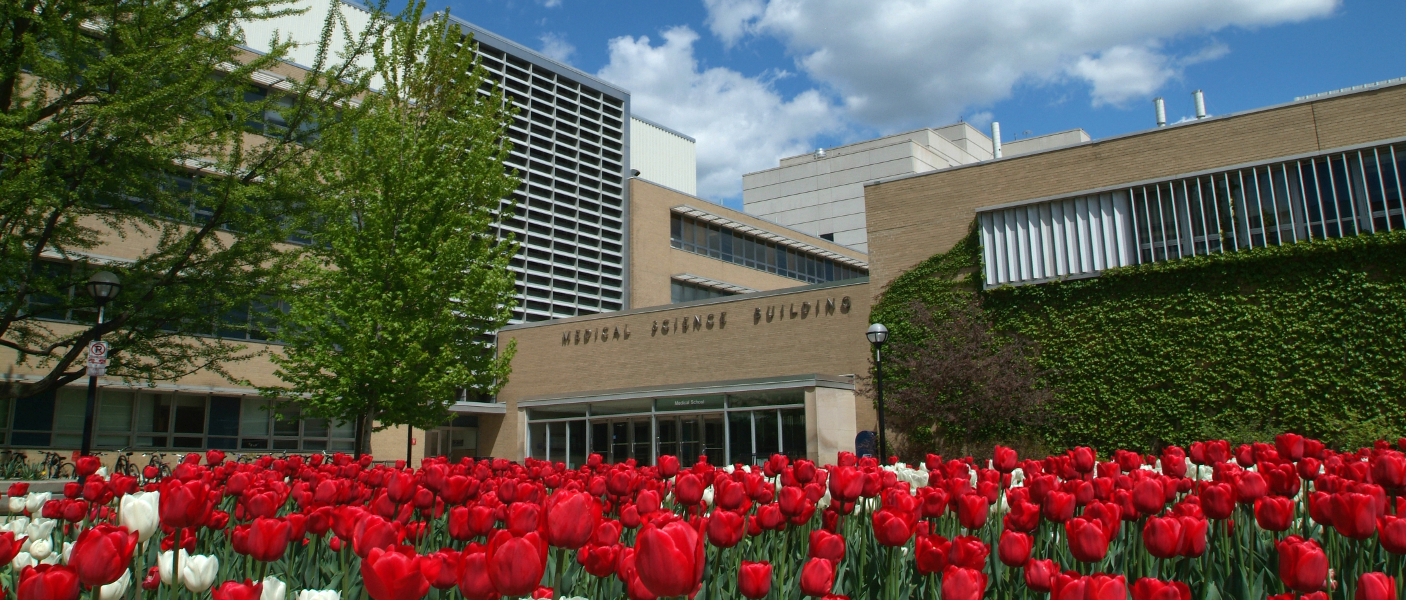

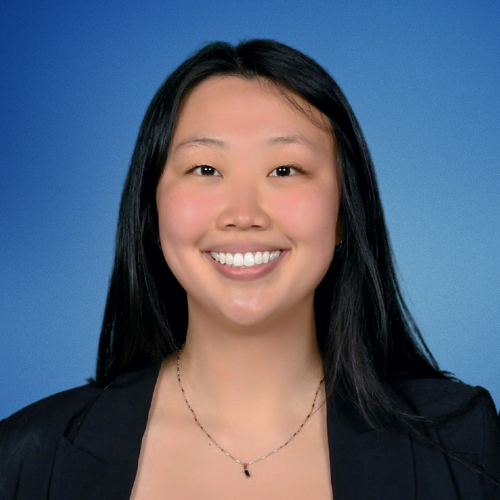 I am originally from Canton, Michigan, where I attended public school before going to the University of Michigan for my undergraduate degree in cell and molecular biology. I really enjoyed my time at Michigan! After graduation, I went to Wayne State University School of Medicine in Detroit to get my MD. I fell in love with the Ann Arbor area during my undergraduate years, and it feels really nice to be in an area I am so familiar with and love. Otherwise, I love being outside hiking, running (even if I am slow), playing sports, or just being outside. Ann Arbor is so green and has so many nice places to enjoy the outdoors; it is a great place to live.
I am originally from Canton, Michigan, where I attended public school before going to the University of Michigan for my undergraduate degree in cell and molecular biology. I really enjoyed my time at Michigan! After graduation, I went to Wayne State University School of Medicine in Detroit to get my MD. I fell in love with the Ann Arbor area during my undergraduate years, and it feels really nice to be in an area I am so familiar with and love. Otherwise, I love being outside hiking, running (even if I am slow), playing sports, or just being outside. Ann Arbor is so green and has so many nice places to enjoy the outdoors; it is a great place to live.
What motivated you to pursue a medical career?
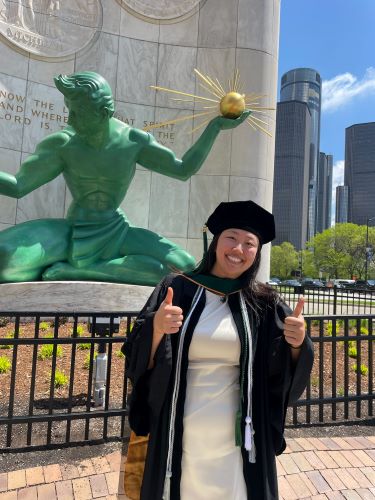
How did you decide on Pathology?
Like biology, Pathology came out of left field for me. I have always considered myself a big people person, and I thought I would pursue something like internal medicine or family medicine. I liked the idea of being a generalist and knowing a lot about a lot of things. But then pathology came into the picture in my third year, at the end of my clinical clerkships. I was having a tough time deciding which specialty to apply to. I decided to keep an open mind. I wanted that romantic “aha” moment, and I hadn’t had that yet. Some of the fourth-year students who were a year ahead of me were applying to pathology and gave an introductory talk about what pathology is and why you should consider pursuing it. The diagnostic nature of the field resonated with me. I particularly enjoyed histology and anatomy in medical school. I decided to shadow a local pathologist at Henry Ford Hospital. Even from day one, I remember feeling so giddy. I felt that “aha” moment. I remember walking out of the hospital at the end of the day and calling my mom to say how much fun I had, even though all we did together was sit at the multi-headed scope. That was a big flag to me saying, “Hey, Chelsea, you really like this!” It was clear from that day on that Pathology was where I should be.
You ranked Michigan highly for the Match. What attracted you to our program?
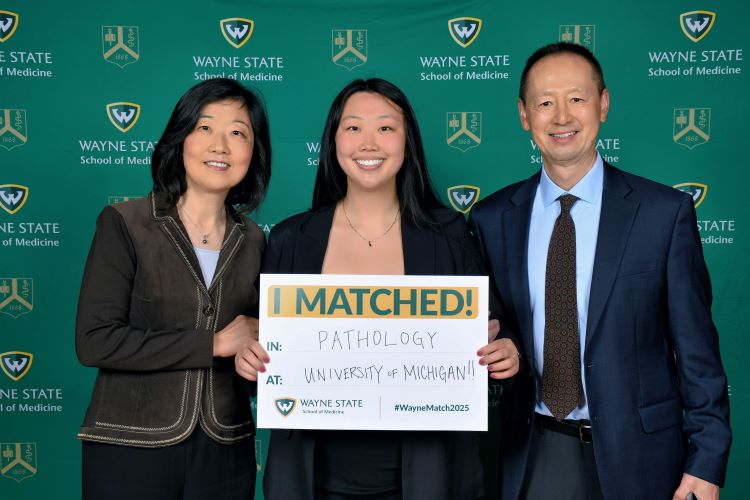
On a personal note, I’m from the area and I attended Michigan for my undergraduate education, I’m familiar with Ann Arbor, and I loved my time here as an undergraduate student. I think having the opportunity to come back as an adult and learn even more about Ann Arbor than I did as a student is nice. Also, being close to my support system, my parents, has been a real pleasure. I am very grateful for that.
I did look at other programs, though. I did a lot of Zoom interviews for the initial interview. Many programs did an excellent job of portraying not only what their program has to offer, but also the personalities of the people underlying the programs. What stood out to me about Michigan was how friendly and well-organized the interview day was. I was very impressed by that. I also had a visiting rotation at Michigan after my interview, which is a bit atypical. Usually, these happen before the interview, but my time slot fell afterward. My visiting rotation cemented my choice for Michigan as my top-ranked program due to the culture. There are many great institutions with great educators to learn from, but what sets Michigan apart is the friendly atmosphere and the environment. I felt so comfortable here. On rotation, I spent time with the autopsy team, frozen sections, Room 1 service, GI service, and GU service. I’m very interested in anatomic pathology, but I am keeping an open mind because I am often proven wrong! I will see where my residency takes me.
Tell us about your time as a resident so far. Is there anything you would like to highlight?
I have been here for one month, and it has been going great. All the residents, all the faculty that I’ve met and worked with have been incredible. Not only are they great educators, but they are also very patient and understanding with all the onboarding difficulties that come up whenever anyone enters a new space. I appreciate everyone taking the extra time to explain what is simple to them in layman’s terms for someone new to the system. I started in microbiology, and now I’m on my immunology rotation. I enjoyed both, which reaffirms that I should keep an open mind about what I want to do one day.
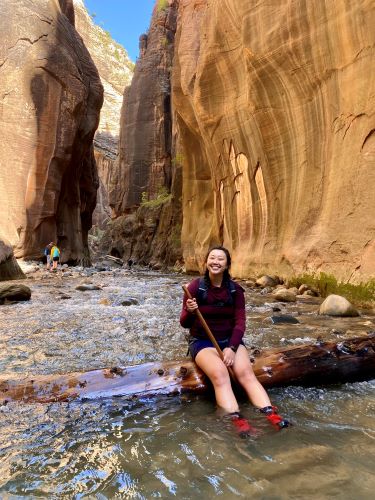 What brings you the most joy in your work?
What brings you the most joy in your work?
Right now, what brings me the most joy is when I feel like I am helping the team to do something productive. I love having a purpose and serving that purpose well, and trying to make other people’s lives easier because of that. That is one thing that makes residency somewhat challenging. Oftentimes, I am the learner in the situation, and I have limited functionality that I can offer to the team. But even after just four weeks, I feel like I am getting a lot of joy in learning the process so I can function well. Oftentimes, we learn most by doing, and so by functioning, I am learning more.
Personally, what brings me joy is being outside. With the summer weather, it has been a lot of fun to get outside to play some pickleball, go for runs, go for walks with my boyfriend, and take picnics by the lake. These have all been great this summer!
Are there any mentors you would like to mention? If so, how did they impact your life?
My most significant professional mentor has been Dr. Favazza, with whom I shadowed at Henry Ford. She is a great educator and a huge proponent of pathology outreach. She welcomes any student into her office to learn with her, regardless of their training level – whether they are an undergraduate, a medical student, or even in high school. I genuinely respect that. I am super grateful that she extended that same generosity to me when I was in medical school and trying to figure out which specialty to pursue. She was crucial and instrumental in my getting into Pathology.
What is your strategy for finding balance between training and your other interests?
That’s a really good question, and I am still figuring it out. I will probably continue trying to figure it out until the day I die. Balance for me comes from spending time with the people I love in my life. My friends in the area, my boyfriend, my parents – finding time to spend with them helps me unwind without thinking about work at all. That quality time has been critical to me in finding balance. Otherwise, I could totally see myself just working even when I get home, trying to learn more because the information that there is to learn is limitless. At some point, you have to set that boundary for yourself to be well enough to keep doing it every day.
What advice would you give medical students considering a career in pathology?
My advice is to go in with an open mind. I think after medical school and being on your clinical rotations, it can be easy to pressure yourself to know things already. As you learn, you are expected to apply these aspects of knowledge to what you do every day. For pathology, many programs don’t have an emphasis on pathology during the clerkship years. I advise that you remain humble and open to learning new things. Those two aspects will take you wherever you want to go with your career. Then have fun with it! People in pathology love teaching, so keep asking questions and being curious.
What are some fun facts about you that we could share?
I have played tennis since I was eight years old. I played on the University of Michigan Club Tennis team while I was here as an undergrad, and my team won the Club Tennis National Championship in Florida my freshman year. It was a very cool way to end my freshman year. That was a lot of fun. I am also into crafting of any sort. That doesn’t mean I am very good at any one of them, but I do particularly enjoy painting and crocheting!
We hope you enjoyed getting to know Chelsea a little bit better. Please be sure to welcome her when you see her around the department.